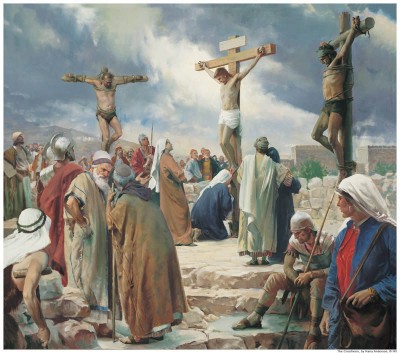The Church of Jesus Christ of Latter-day Saints, whose members are sometimes called Mormons, recently issued the following statement:
Mormons believe we are saved through the atonement of Jesus Christ.
In the mid-19th century, when rhetorical, emotional oratory was common, some church members and leaders used strong language that included notions of people making restitution for their sins by giving up their own lives.
However, so-called “blood atonement,” by which individuals would be required to shed their own blood to pay for their sins, is not a doctrine of The Church of Jesus Christ of Latter-day Saints. We believe in and teach the infinite and all-encompassing atonement of Jesus Christ, which makes forgiveness of sin and salvation possible for all people.” (See Mormon Church Statement on Blood Atonement.)
Many people do not realize that every word spoken by a prophet or other church leader is not official doctrine. Prophets, like everyone else, have agency and intelligence and, when a specific doctrine has not been given to us from God, is permitted to make his own decision. Sometimes they discuss these personal beliefs in public. In past times, leaders were not as cautious about this as they are today. In today’s world, where the most casual statement can live forever on the Internet, leaders often preface opinions with a reminder that this is what they are. However, when the Church was younger and smaller, this was not always true. Unless a belief has been canonized, it is not official doctrine. Blood atonement is one such belief, arising out of the common beliefs of the time.
Many people use as their source for this teaching the Journal of Discourses, a book containing various talks by early church leaders. However, this record is not an official church publication and the talks were not recorded and were not official versions. They are based on notes taken by listeners and were not vetted by the leaders themselves. General Conferences, the semi-annual gathering of the Mormons, was different then than it is now, and in the first year of the Church, attendees could even ask the speakers questions and get opinions from them. The Journal of Discourses was intended to be used like a newspaper, not a book of scripture or doctrine. It was written for those who lived far from the central church.
The Mormons teach that we are saved through the atonement of Christ. It is His blood that saves us, not our own. “But if we walk in the light, as he is in the light, we have fellowship one with another, and the blood of Jesus Christ his Son cleanseth us from all sin.” (1 John 1:7)
This teaching is expanded on by Elder David A. Bednar, an apostle of Jesus Christ in modern times:
Prophets throughout the ages have emphasized the dual requirements of (1) avoiding and overcoming bad and (2) doing good and becoming better. Consider the penetrating questions posed by the Psalmist:
“Who shall ascend into the hill of the Lord? or who shall stand in his holy place?
“He that hath clean hands, and a pure heart; who hath not lifted up his soul unto vanity, nor sworn deceitfully” (Psalm 24:3–4).
Brothers and sisters, it is possible for us to have clean hands but not have a pure heart. Please notice that both clean hands and a pure heart are required to ascend into the hill of the Lord and to stand in His holy place.
Let me suggest that hands are made clean through the process of putting off the natural man and by overcoming sin and the evil influences in our lives through the Savior’s Atonement. Hearts are purified as we receive His strengthening power to do good and become better. All of our worthy desires and good works, as necessary as they are, can never produce clean hands and a pure heart. It is the Atonement of Jesus Christ that provides both a cleansing and redeeming power that helps us to overcome sin and a sanctifying and strengthening power that helps us to become better than we ever could by relying only upon our own strength. The infinite Atonement is for both the sinner and for the saint in each of us.
In the Book of Mormon, we find the masterful teachings of King Benjamin concerning the mission and Atonement of Jesus Christ. The simple doctrine he taught caused the congregation to fall to the earth, for the fear of the Lord had come upon them. “And they had viewed themselves in their own carnal state, even less than the dust of the earth. And they all cried aloud with one voice, saying: O have mercy, and apply the atoning blood of Christ that we may receive forgiveness of our sins, and our hearts may be purified; for we believe in Jesus Christ, the Son of God, who created heaven and earth, and all things; who shall come down among the children of men” (Mosiah 4:2; emphasis added), (David A. Bednar, “Clean Hands and a Pure Heart,” Liahona, Nov 2007, 80–83).
Mormons teach that grace comes to us through the atonement of Jesus Christ. It is what allows us to overcome death to live forever. Grace also allows us to repent of our sins and to be forgiven after we have done so. This comes to us without any conditions—every person who has ever lived on this earth has the gift of grace without any acts at all. Mormons do not believe the act of accepting Jesus Christ as our Savior is required to receive God’s grace. It is without conditions.
However, to receive the fullness of the atonement, we must follow the teachings of Jesus Christ and live the gospel. Doing so allows us to return to God’s presence. The scriptures teach us that no unclean thing can dwell in God’s presence, and so we must cleanse ourselves and live as pure a life as possible while we’re on the earth. Of course mistakes happen. No one is perfect. However, through the atonement and grace, we are able to repent and start over as often as necessary and in time, this way, we will feel worthy to be in God’s presence. We will be ourselves in Heaven; to make it the perfect place God promised us, it can only be filled with those who love God and keep His commandments.
“If ye love me, keep my commandments” (John 14:15) Jesus taught. He repeated again and again the importance of obeying God’s commandments, warning that only those who do will be with God again. “Not every one that saith unto me, Lord, Lord, shall enter into the kingdom of heaven; but he that doeth the will of my Father which is in heaven. (Matthew 7:21)
However, although we must obey the commandments and we must repent when we fall short, we cannot bring about our own atonement by doing so. Only the voluntary atonement of Jesus Christ, which happened in the Garden of Gethsemane and on the cross at Calvary could bring about our atonement. We cannot use our own blood to atone for our sins, no matter what type they are, because the atonement required the voluntary sacrifice of a perfect being. For this reason, Mormons do not believe in blood atonement as the term is used to describe capital punishment.


